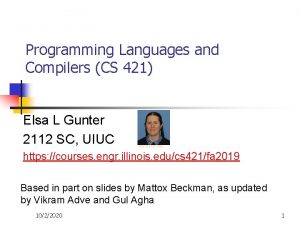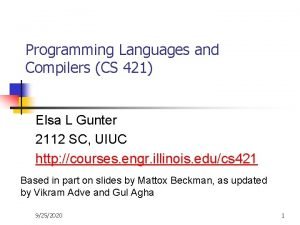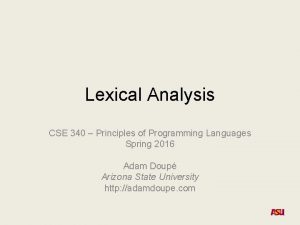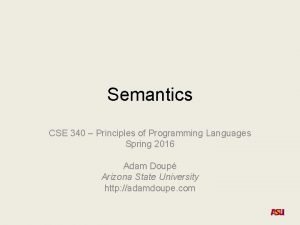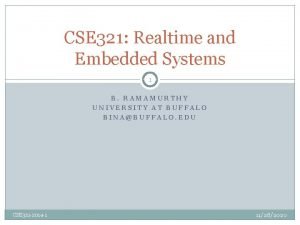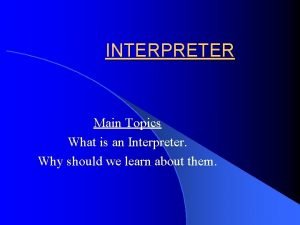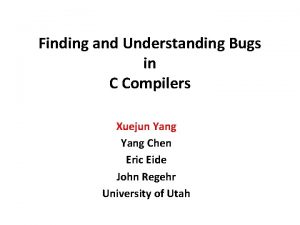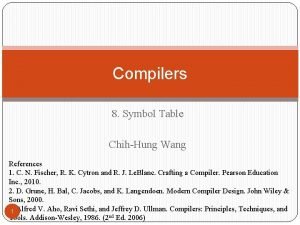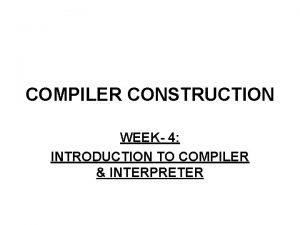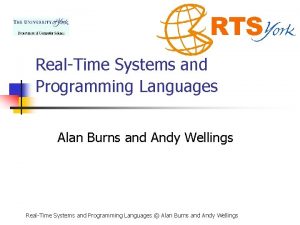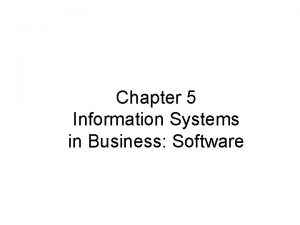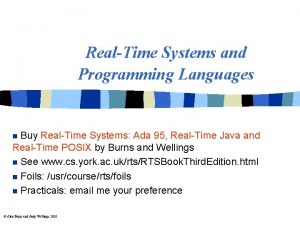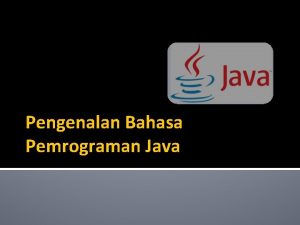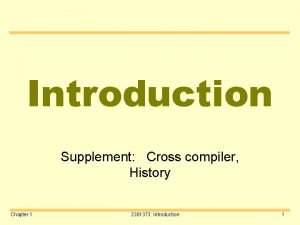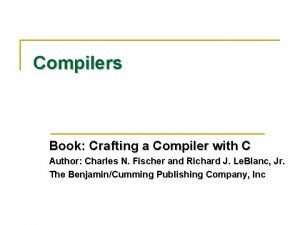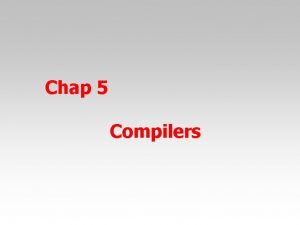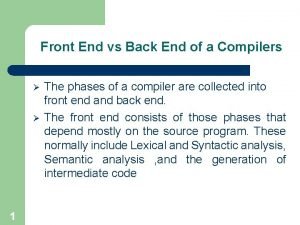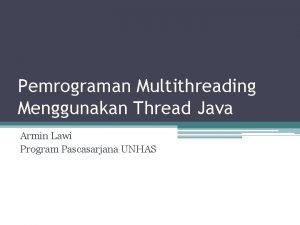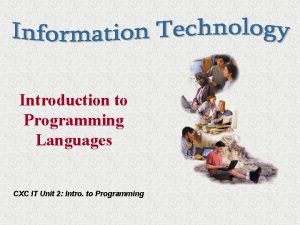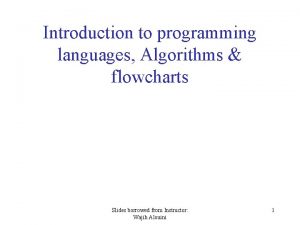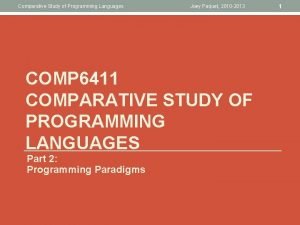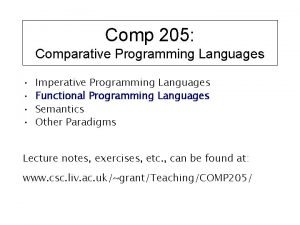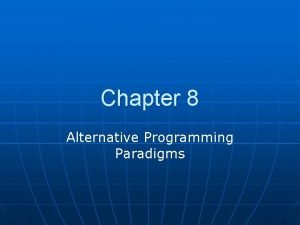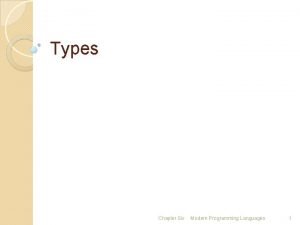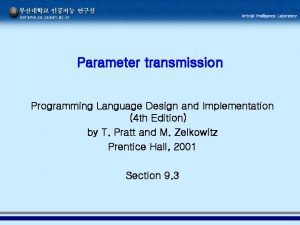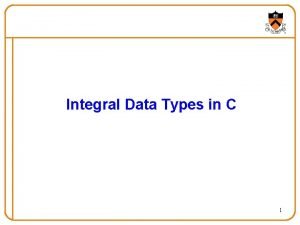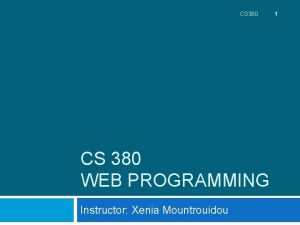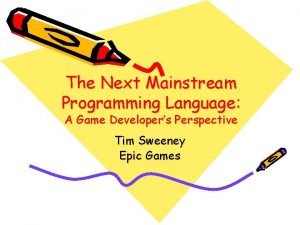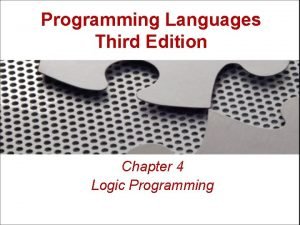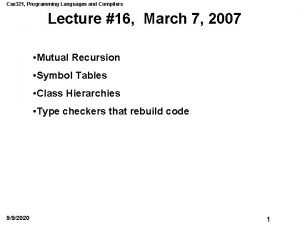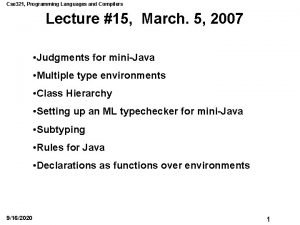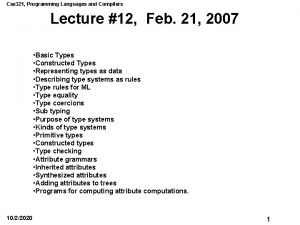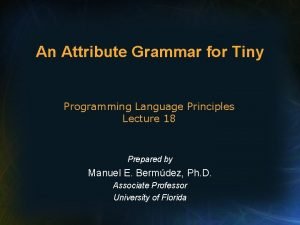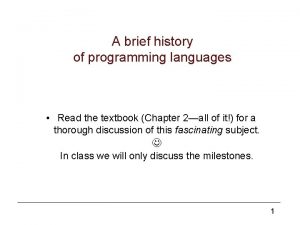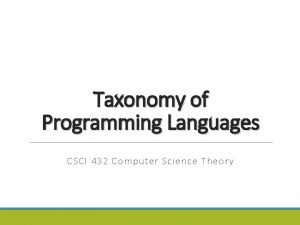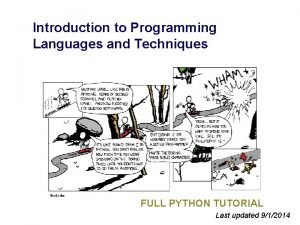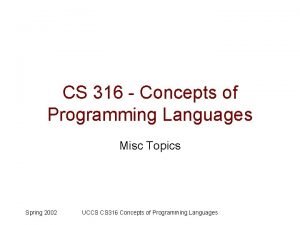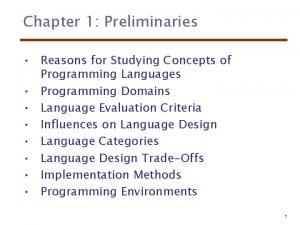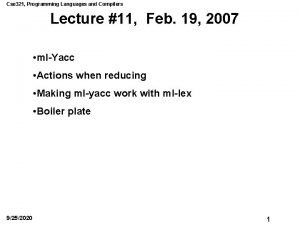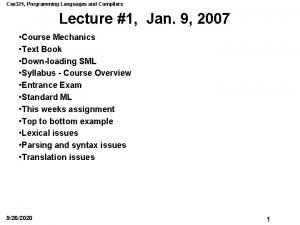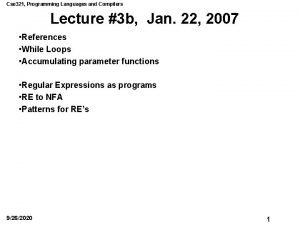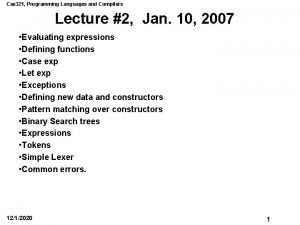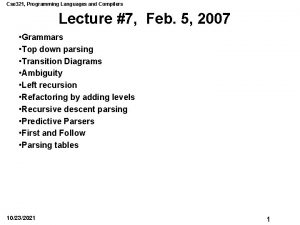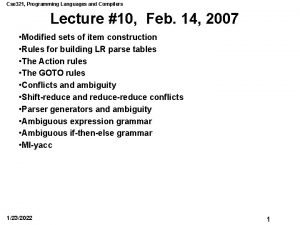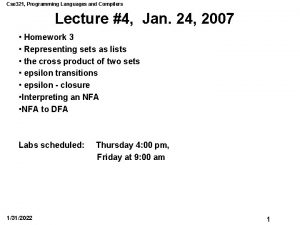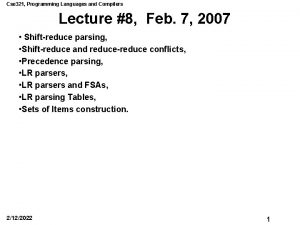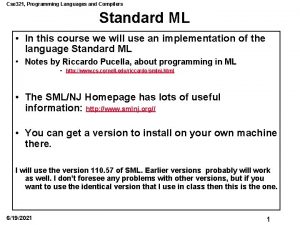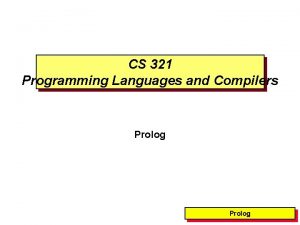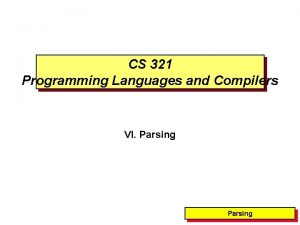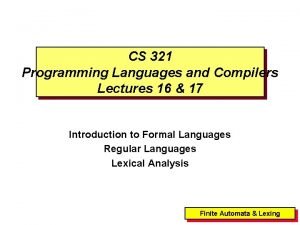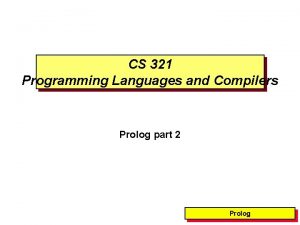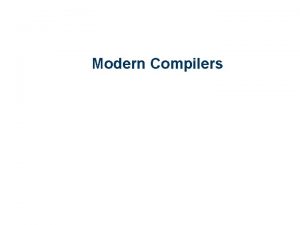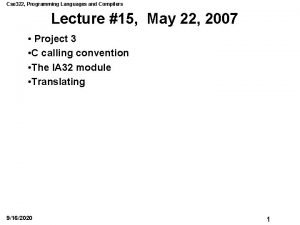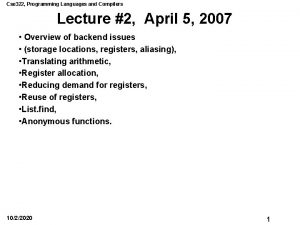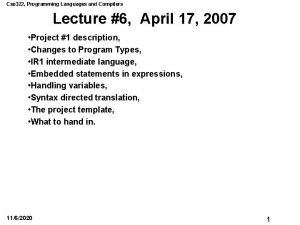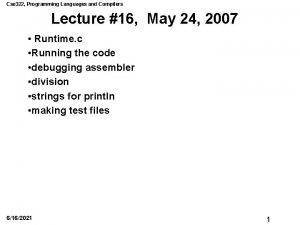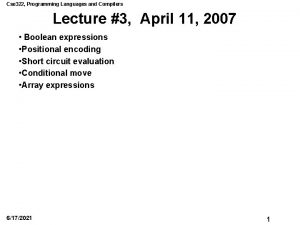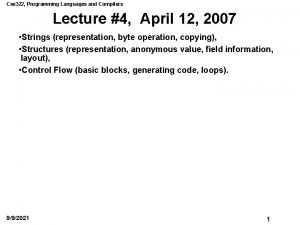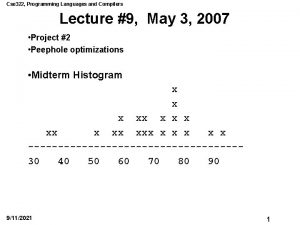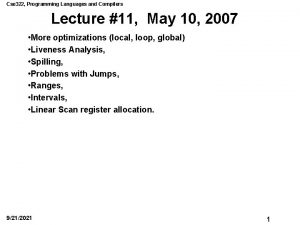Cse 321 Programming Languages and Compilers Lecture 15







































- Slides: 39

Cse 321, Programming Languages and Compilers Lecture #15, March. 5, 2007 • Judgments for mini-Java • Multiple type environments • Class Hierarchy • Setting up an ML typechecker for mini-Java • Subtyping • Rules for Java • Declarations as functions over environments 9/16/2020 1

Cse 321, Programming Languages and Compilers • HW 10, Assigned last week, due Wed, – excellent warmup for project 3 • Project 3 assigned today – See webpage for details 9/16/2020 2

Cse 321, Programming Languages and Compilers Types for mini-Java • Mini-Java has two kinds of programs – Expressions – Statements • We need a judgment for each kind – Expressions Th, C, TE |- exp : type – Statements R, Th, C, TE |= stmt • Subtyping judgment – C |~ t 1 ≤ t 2 • Equality judgment – t 1 = t 2 9/16/2020 3

Cse 321, Programming Languages and Compilers Environments • TE - Type environments – TE(x) = t – The variable x has type t in the environment TE • R - Return mode – R = { void , explicit t , none} – void means the method has type return type void and no expression is expected after a return statement – Explicit t means the method has return type t and the argument of a return must present be a subtype of t • C - Class Hierarchy – The set of classes is arranged into a hierarchy – Class colorpoint extends point {. . . } – C defines x » There is a class definition for x • Th – the type of the self object “this” 9/16/2020 4

Cse 321, Programming Languages and Compilers Class Hierarchy object point colorpoint numeric int double boolean void C |~ int ≤ object C |~ colorpoint ≤ point C |~ boolen ≤ object C defines point 9/16/2020 5

Cse 321, Programming Languages and Compilers Type Checkers in ML • To build type-checkers in ML we need – A datatype to represent types – A datatype (or datatypes) to represent programs (whose type we are checking) » Expressions » Statements » Declarations – A means for computing equality and subtyping over types – A means for expressing type errors 9/16/2020 6

Cse 321, Programming Languages and Compilers Representing Types type Id = string; (** Representing types for mini-Java **) datatype Basic = Bool | Int | Real; datatype Type = Basic. Type of Basic | Array. Type of Basic | Obj. Type of Id | Void. Type; 9/16/2020 7

Cse 321, Programming Languages and Compilers Representing Programs 1 - Auxillaries (* A slot of type (`x TC) is an option type. The *) (* parser places NONE there and the type-checker *) (* fills it in with (SOME x) when "x" is known *) type 'x TC = 'x option; (**** Representing Programs *******) datatype Op (* infix operators = ADD | SUB | MUL | DIV (* Arithmetic | AND | OR (* logical | EQ | NE | LT | LE | GT | GE (* relational datatype Constant = Cint of int | Creal of string | Cbool of bool 9/16/2020 *) *) (* Literal constants *) 8

Cse 321, Programming Languages and Compilers Representing Programs 2 - expressions datatype Exp = Literal of Constant (* | Binop of Op * Exp (* | Relop of Op * Exp (* | Not of Exp (* | Array. Elm of Exp * (Basic TC) (* | Array. Len of Exp (* | Call of Exp * Id *(Id TC)* Exp list (* | New. Array of Basic * Exp (* | New. Object of Id (* (* Coerce is used only in type checking | Coerce of Exp 9/16/2020 5, 6. 3, true x + 3 x < 7. 7 ! x x[3] x. length() x. f(1, z) new int[3] new point() *) *) *) 9

Cse 321, Programming Languages and Compilers Representing Programs 3 - statements datatype Stmt = Block of Stmt list (* {x: 5; print(2)} | Assign of Exp option * Id * Exp option * Exp (* p. x[2]=5 p. x=5 | Call. Stmt of Exp * Id * (Id TC)* Exp list (* x. f(1, z) | If of Exp * Stmt (* if (p<2) x=5 else x=6 | While of Exp * Stmt (* while (p) s | Print. E of Exp (* System. out. println(x) | Print. T of string (* System. out. println("zbc") | Return of Exp option; (* return (x+3) 9/16/2020 10 *) *)

Cse 321, Programming Languages and Compilers Representing programs 4 - declarations datatype Var. Decl = Var. Decl of Type * Id * Exp option; datatype Formal = Formal of Type * Id; datatype Met. Decl = Met. Decl of Type * Id * Formal list * Var. Decl list * Stmt list; datatype Class. Dec = Class. Dec of Id * Var. Decl list * Met. Decl list; datatype Program = Program of Class. Dec list; 9/16/2020 11

Cse 321, Programming Languages and Compilers Type Equality • In mini-Java we need both type equality and sub-typing • Type equality for testing that the primitive operators are applied to appropriate expressions of the correct type. Type equality is over basic types. • Sub-typing for method calls and assignments, testing that actual arguments are subtypes of the formal arguments. Subtyping is over all types. 9/16/2020 12

Cse 321, Programming Languages and Compilers Type Equality over basic types fun typeeq (x, y) = case (x, y) of (Real, Real) => true | (Int, Int) => true | (Bool, Bool) => true | (_, _) => false • Pair wise pattern match over the basic types 9/16/2020 13

Cse 321, Programming Languages and Compilers Type equality fun typeeq (x, y) = case (x, y) of (Basic. Type x, Basic. Type y) => basiceq(x, y) | (Array. Type x, Array. Type y) => basiceq(x, y) | (Obj. Type x, Obj. Type y) => x=y | (Void. Type, Void. Type) => true | (_, _) => false 9/16/2020 14

Cse 321, Programming Languages and Compilers Subtyping fun subtype class. H (x, y) = case (x, y) of (x, Obj. Type “object”) => true | (Basic. Type Int, Obj. Type “numeric”) => true | (Basic. Type Real, Obj. Type “numeric”) => true | (Obj. Type x, Obj. Type y) => use. Tree class. H (x, y) | (_, _) => typeeq(x, y); Fun use. Tree class (x, y) =. . . 9/16/2020 15

Cse 321, Programming Languages and Compilers Expressing Errors • In ML we are lucky to have a rich exception mechanism. • Design a set of exceptions to report errors. • You might want to define helper functions – fun showt t =. . . – fun report exp computed expected =. . . 9/16/2020 16

Cse 321, Programming Languages and Compilers Type rules for mini-java • • One rule for each piece of syntax Use the different judgments accordingly Expression has type Th, C, TE |- exp : type Th, R, C, TE |= stmt Statement is well formed C |~ t 1 ≤ t 2 t 1 = t 2 t 1 is a subtype of t 2 C defines x Th, C, TE |- Y. f : (s 1, … , sn) → t Th, C, TE |- Y. x : t [ ] Class Y has method f with domain and range Class Y has variable x with type Op <+> : (t 1, t 2) -> t 3 t is basic x TE 9/16/2020 and TE (x) = t 17

Cse 321, Programming Languages and Compilers Simple Expressions • Th, C, TE |- n : int n is integer constant like 5 • Th, C, TE |- r : double r is real constant like 5. 3 • Th, C, TE |- this : Th • Th, C, TE |- true : boolean • Th, C, TE |- false : boolean 9/16/2020 18

Cse 321, Programming Languages and Compilers Variables TE (x) = t --------------R, Th, C, TE |= x : t Th, C, TE |- e 1 : Y C defines Y Th, C, TE |- Y. x : t -----------------R, Th, C, TE |= e 1. x : t x TE C defines Th Th, C, TE |- Th. x : t ---------------R, Th, C, TE |= x : t 9/16/2020 19

Cse 321, Programming Languages and Compilers Operators Th, C, TE |- e 1 : t 1 Th, C, TE |- e 2 : t 2 Op <+> : (t 1, t 2) -> t 3 --------------Th, C, TE |- e 1 <+> e 2 : t 3 Th, C, TE |- e 1 : boolean --------------Th, C, TE |- ! e 1 : boolean 9/16/2020 20

Cse 321, Programming Languages and Compilers Arrays Th, C, TE |- e 1 : t [ ] Th, C, TE |- e 2 : int --------------Th, C, TE |- e 1[ e 2] : t Th, C, TE |- e : t [ ] --------------Th, C, TE |- e. length() : int 9/16/2020 21

Cse 321, Programming Languages and Compilers Method call Expressions • Note that f(x) is really shorthand for this. f(x) C defines Th Th, C, TE |- Th. f : (s 1, … , sn) → t Th, C, TE |- ei : ti C |~ ti ≤ si --------------Th, C, TE |- f(e 1, … , en) : t Th, C, TE |- exp : X C defines X Th, C, TE |- X. f : (s 1, … , sn) → t Th, C, TE |- ei : ti C |~ ti ≤ si --------------Th, C, TE |- exp. f(e 1, … , en) : t 9/16/2020 22

Cse 321, Programming Languages and Compilers New arrays and objects Th, C, TE |- e : t t is basic --------------Th, C, TE |- new t [e] : t [ ] C defines x --------------Th, C, TE |- new x ( ) : x 9/16/2020 23

Cse 321, Programming Languages and Compilers Judgments over Statements • We use a different notation for typing statements • The judgment for statements does not have a return type. • It also uses a different “turnstile” symbol. • R, Th, C, TE |= e 1. x [ e 2] = e 3 9/16/2020 24

Cse 321, Programming Languages and Compilers Static Implicit Assignment TE (x) = t [ ] TE |- e 2 : int Th, C, TE |- e 3 : t --------------R, Th, C, TE |= x [ e 2] = e 3 Static, because the variable is in the type environment. This means the variable is a either a parameter or local variable to the current method. TE (x) = t Th, C, TE |- e 2 : t --------------R, Th, C, TE |= x = e 2 9/16/2020 25

Cse 321, Programming Languages and Compilers Explicit Hierarchical Assignment Statements Th, C, TE |- e 1 : Y C defines Y Th, C, TE |- Y. x : t [ ] Th, C, TE |- e 2 : int Th, C, TE |- e 3 : t --------------R, Th, C, TE |= e 1. x [ e 2] = e 3 Explicit because the object for containg the variable is explicit in the code 9/16/2020 Th, C, TE |- e 1 : Y C defines Y Th, C, TE |- Y. x : t Th, C, TE |- e 2 : t --------------R, Th, C, TE |= e 1. x = e 2 26

Cse 321, Programming Languages and Compilers Hierarchical Implicit Assignment x TE C defines Th Th, C, TE |- Th. x : t [ ] Th, C, TE |- e 2 : int Th, C, TE |- e 3 : t --------------R, Th, C, TE |= x [ e 2] = e 3 These rules hold only if the variable is not in the type environment x TE C defines Th Th, C, TE |- Th. x : t Th, C, TE |- e 2 : t --------------R, Th, C, TE |= x = e 2 Implicit because the object containg the variable is not in the code. 9/16/2020 27

Cse 321, Programming Languages and Compilers Note 3 forms of assignment static TE (x) = t Th, C, TE |- e 2 : t --------------R, Th, C, TE |= x = e 2 Implicit hierarchical x TE C defines Th Th, C, TE |- Th. x : t Th, C, TE |- e 2 : t --------------R, Th, C, TE |= x = e 2 9/16/2020 Explicit hierarchical Th, C, TE |- e 1 : Y C defines Y Th, C, TE |- Y. x : t Th, C, TE |- e 2 : t --------------R, Th, C, TE |= e 1. x = e 2 28

Cse 321, Programming Languages and Compilers If statement R, Th, C, TE |= s 1 Th, C, TE |- e 1 : boolean --------------------R, Th, C, TE |= if ( e 1 ) s 1 R, Th, C, TE |= s 2 Th, C, TE |- e 1 : boolean --------------------R, Th, C, TE |= if ( e 1 ) s 1 else S 2 9/16/2020 29

Cse 321, Programming Languages and Compilers While and Print statement R, Th, C, TE |= s 1 Th, C, TE |- e 1 : boolean --------------------R, Th, C, TE |= while ( e 1 ) s 1 t is basic Th, C, TE |- x : t ----------------------------R, Th, C, TE |= System. out. println ( x ) R, Th, C, TE |= System. out. println ( “literal string” ) 9/16/2020 30

Cse 321, Programming Languages and Compilers Return statement Void, Th, C, TE |= return C |~ t ≤ s Th, C, TE |- e : s -------------------------Explicit t, Th, C, TE |= return e 9/16/2020 31

Cse 321, Programming Languages and Compilers Method call statements Th, C, TE |- ei : ti C defines Th Th, C, TE |- Th. f : (s 1, … , sn) → Void C |~ ti ≤ si --------------R, Th, C, TE |= f(e 1, … , en) Th, C, TE |- ei : ti C defines X Th, C, TE |- X. f : (s 1, … , sn) → Void C |~ ti ≤ si Th, C, TE |- exp : X --------------R, C, TE |= exp. f(e 1, … , en) 9/16/2020 32

Cse 321, Programming Languages and Compilers Sequences of statements R, Th, C, TE |= si --------------R, Th, C, TE |= { s 1, … , sn } 9/16/2020 33

Cse 321, Programming Languages and Compilers Declarations • Declarations are type-environment to typeenvironment functions. R, Th, C, TE |= decl → R, Th, C, TE There are four kinds of declarations – Var-declarations – Method-declarations » Are mutually recursive – Class-declarations – Main method declaration » There is only one of these in any program 9/16/2020 34

Cse 321, Programming Languages and Compilers One Var declaration R, Th, C, TE |= t x ; → R, Th, C, TE+(x: t) Th, C, TE |- e : t ----------------------------------R, Th, C, TE |= t x = e ; → R, Th, C, TE+(x: t) 9/16/2020 35

Cse 321, Programming Languages and Compilers Many Var declarations R, Th, C, TE |= d 1 → R 1, Th 1, C 1, TE 1 |= d 2 → R 2, Th 2, C 2, TE 2 |= d 3 → R 3, Th 3, C 3, TE 3 ------------------------------------------- R, Th, C, TE |= {d 1; d 2; d 3; …} → R 3, Th 3, C 3, TE 3 9/16/2020 36

Cse 321, Programming Languages and Compilers Mutually recursive Method Declaration TEA = TE + (f 1, method Th (t 11, … , tn 1) →t 1) + … + (fk, method Th (t 1 k, … , tnk) →tk) TEA |= (t 1 k x 1 k, … tnk xnk) → TEBk |= (v 1; … ; vi ) → TECk tk, Th, C, TECk |= {s 1; … ; sj } -----------------------------------R, Th, C, TE |= { public t 1 f 1 (t 1 x 1, … tn xn) { v 1; … ; vi ; s 1; … ; sj } ; …; public tk fk (t 1 x 1, … tn xn) { v 1; … ; vi ; s 1; … ; sj } } → R, Th, C, TEA 9/16/2020 37

Cse 321, Programming Languages and Compilers Class Declarations • Class declarations extend the Class heirarchy R, Th, C+(y/x), TE |= { v 1; … ; vi ; m 1; … ; mj } → R 2, Th 2, C 2 TE 2 -------------------------------R, Th, C, TE |= Class x extends y { v 1; … ; vi ; m 1; … ; mj } → R 2, Th 2, C 2 TE 2 9/16/2020 38

Cse 321, Programming Languages and Compilers New Boiler plate for Parser Program. Types. sml structure Program. Types = struct (* Put type declarations here that you *) (* want to appear in both the parser *) (* and lexer. You can open this structure *) (* else where inside your application as well (* I’ve put the datatypes for the syntax here to start *) end; Mini. cm group is Program. Types. sml Mini. lex Mini. grm Driver. sml Type. Check. sml $/basis. cm $/smlnj-lib. cm $/ml-yacc-lib. cm 9/16/2020 39
 Cs 421
Cs 421 Cs 421 uiuc
Cs 421 uiuc Cse 340 principles of programming languages
Cse 340 principles of programming languages Vineeth kashyap
Vineeth kashyap Cse 321
Cse 321 Pros and cons of compilers and interpreters
Pros and cons of compilers and interpreters Finding and understanding bugs in c compilers
Finding and understanding bugs in c compilers Symbol table implementation in lex and yacc
Symbol table implementation in lex and yacc Disadvantages of compiler
Disadvantages of compiler Real-time systems and programming languages
Real-time systems and programming languages Advantages and disadvantages of programming languages
Advantages and disadvantages of programming languages Real-time systems and programming languages
Real-time systems and programming languages C++ binarymove
C++ binarymove Cross compilers
Cross compilers Crafting a compiler
Crafting a compiler Machine dependent compiler features
Machine dependent compiler features Explain compiler construction tools
Explain compiler construction tools 01:640:244 lecture notes - lecture 15: plat, idah, farad
01:640:244 lecture notes - lecture 15: plat, idah, farad Multithreading program in java
Multithreading program in java Cxc it
Cxc it Introduction to programming languages
Introduction to programming languages Plc
Plc Joey paquet
Joey paquet Comparative programming languages
Comparative programming languages Alternative programming languages
Alternative programming languages Strongly typed vs weakly typed
Strongly typed vs weakly typed Transmission programming languages
Transmission programming languages Types of programming languages
Types of programming languages Xenia programming languages
Xenia programming languages Mainstream programming languages
Mainstream programming languages Programing languages
Programing languages Programming languages
Programming languages Programming languages
Programming languages Programming languages
Programming languages Tiny programming language
Tiny programming language Brief history of programming languages
Brief history of programming languages Lisp_q
Lisp_q Low level language
Low level language If programming languages were cars
If programming languages were cars Reasons for studying concepts of programming languages
Reasons for studying concepts of programming languages
